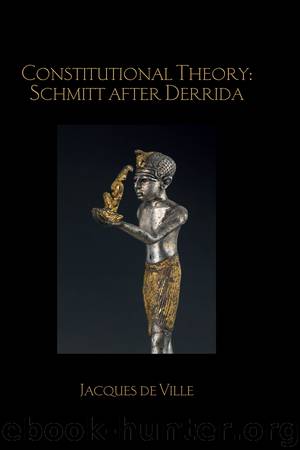Constitutional Theory: Schmitt After Derrida by Jacques de Ville

Author:Jacques de Ville
Language: eng
Format: epub
Publisher: Taylor & Francis (CAM)
Section A Khōra
Introduction
In Chapter 3 and in the introduction above we encountered Schmitt’s so-called ‘positive concept of the constitution [der positive Verfassungsbegriff]’, which as we saw involves a conscious decision about the nature and form of political existence, ‘which the political unity reaches for itself and gives to itself [sich selber gibt] through the bearer of constituent power’ (CT 75–6/VL 21).1 Schmitt’s positive concept, as we further saw, requires the drawing of a distinction between the constitution and constitutional law(s). The constitution as such refers to the decision on the form and nature of the political unity, for example a constitutional democracy in the form of a federal state, which is often to be found in the preamble to the constitution. Constitutional law(s) on the other hand refers to all other constitutional law provisions, whether or not contained in the constitutional text itself. The modern idea of a constitution as a conscious, political decision by the people that returns to itself in its own identity can clearly be seen here,2 as well as the repetition of the Platonic legacy, which appears from the attempt to arrive at the essence of the constitution (Chapter 1). The notion of the constitution as gift3 is implicit in this modern conception, and is brought to the fore more explicitly in Schmitt’s text.4 In elaborating on the notion of a constitution as something that is given, Schmitt (CT 76/VL 22) insists that a constitution cannot come into being by itself, as is supposed by the absolute conception of the constitution proposed by normativism. A constitution also does not attain its validity from the fact that it is normatively correct, as is supposed, for example, by the liberal ideal concept of the constitution, or because of its systematic closure (ihrer systematischen Geschlossenheit) (CT 76/VL 22). Schmitt (CT 76/VL 22) spells out the nature of this gift as follows: ‘It [i.e. the constitution] does not give itself (to itself), but is given to a concrete political unity [Sie gibt sich nicht selbst, sondern wird für eine konkrete politische Einheit gegeben]’. A few lines down, Schmitt (CT 76/VL 22) explains that a constitution attains its validity by virtue of the existing political will of those who give it (des existierenden politischen Willens desjenigen, der sie gibt), that is, the constituent power. Yet it is difficult to deny that the sentence quoted above can also be read as alluding to something else, that is, to a gift in the absence of any subject, to a political unity, and thus also to the constituent power acting by virtue of this political unity (Chapter 3 above), a reading which Schmitt subsequently seeks to close down.
Schmitt’s reflections in Constitutional Theory on the constitution as gift resonate with Derrida’s Khôra (1993d), which involves a detailed reading of certain sections of Plato’s Timaeus, which concerns itself with the origins of the universe. In the latter texts a gift is likewise at stake, one which appears to move beyond the notion of a circular return.
Download
This site does not store any files on its server. We only index and link to content provided by other sites. Please contact the content providers to delete copyright contents if any and email us, we'll remove relevant links or contents immediately.
The Thirst by Nesbo Jo(5819)
Permanent Record by Edward Snowden(5027)
The Myth of the Strong Leader by Archie Brown(4807)
Spare by Prince Harry The Duke of Sussex(4242)
A Higher Loyalty: Truth, Lies, and Leadership by James Comey(4054)
Secrecy World by Jake Bernstein(3802)
Adulting by Kelly Williams Brown(3702)
The Borden Murders by Sarah Miller(3602)
Killers of the Flower Moon by David Grann(3286)
Fear by Bob Woodward(3272)
The Last Girl by Nadia Murad(3071)
The Secret Barrister by The Secret Barrister(3026)
Future Crimes by Marc Goodman(3015)
American Kingpin by Nick Bilton(2998)
Liar's Poker by Michael Lewis(2831)
The House on Mango Street by Sandra Cisneros(2789)
Graduate Admissions Essays, Fourth Edition: Write Your Way into the Graduate School of Your Choice (Graduate Admissions Essays: Write Your Way Into the) by Asher Donald(2486)
Delicious Torment by Linsey Lanier(2455)
Camino Island by John Grisham(2401)
